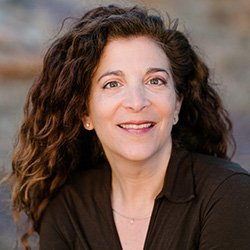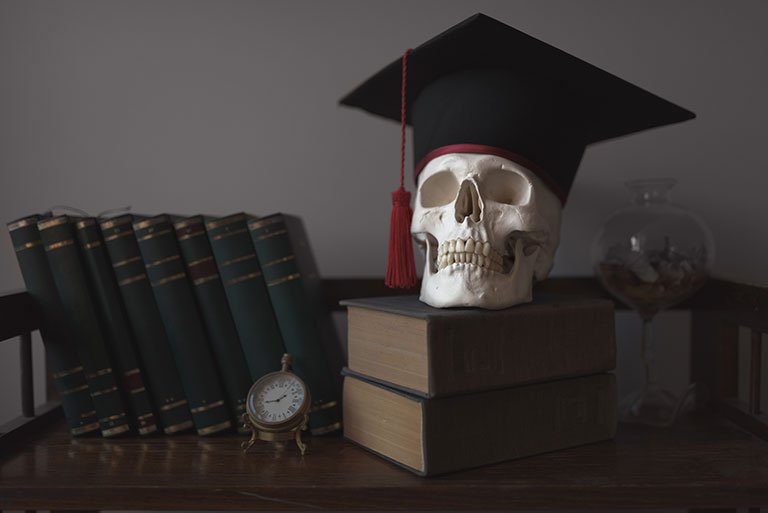Dawn Gross has a combined MD and PhD from Tufts University School of Medicine and the Sackler School of Biomedical Sciences. She has a triple specialization in internal medicine, hematology (focus on bone marrow transplantation), and hospice and palliative medicine. Through medicine and public outreach, Dawn is determined to educate people about how to have better dialogues around end of life, and how to live as fully as possible. She is the host of “Dying to Talk,” a call-in radio show dedicated to reducing the taboo and creating a safe space to talk about death. Recently Dawn and a colleague have created a Death Education curriculum for high school students. She is an attending physician at the University of California, San Francisco and a fellow of the American Academy of Hospice and Palliative Medicine.
Why don’t you start by telling me more about the Death-ed project?
It started as a collaboration with Jessica Zitter, who is an ICU doctor who focuses on palliative care. She and I had been thinking that we should do something together for a while, we just didn’t know what that was. And then the call for ideas came from the design firm IDEO. The firm created this online platform called Open IDEO to ask questions and facilitate a community-designed thinking process to try and find solutions. They tackle a variety of things, and in this iteration they tackled the question, How do we reimagine, or Can we reimagine, end of life? And when I saw this call for involvement, I was like, oh my God, if I don’t participate in this what good am I?
We are so averse to death. But we’re not born that way. We have an instinctual desire to live, for sure. But the taboo or aversion to talking about our mortality is not something we were born with. There is a difference between wanting to live and being averse to talking about mortality; it’s not the same thing. And I know that’s true because if you look at children they have no problem being just as curious about “What is that between your legs?” as they are about “What happened to my goldfish?” Those questions are equally important! When you’re a kid you don’t realize what you’re allowed to ask and not allowed, you just ask everything. But then we teach them over time by acting like we can’t talk about certain things.
So Jessica Zitter and I drafted a proposal outlining a death curriculum for schools using an approach similar to that of sex education, given it is also a universally relevant and taboo subject. And knowing the difference that sex-ed has made over the decades of being incorporated into traditional education, we used this as our framework and our background to give evidence to what “death-ed” would be. We had both been really meditating on this, so it took us no time and our proposal to IDEO placed in the top 50.
We piloted the program in our children’s own schools. At first, the response from each of the schools was rather incredulous. The teachers said, “Death-ed?!” And we said, “Yeah, like sex-ed, but for death.” And the minute we said that, the lightbulbs went off and the door swung open.
My hope is to make Death-ed something that educators can take and incorporate into their own style and curriculum structure throughout public education. I want any educator to be able to teach this, so I want to work with actual curriculum experts to put it in the right format and language so it can be distributed.
In medical school, what is the approach to teaching students how to talk about mortality and end-of-life issues with patients?
As doctors we are trained to be experts on diagnosis and treatment. However, we can’t be experts on what the patient wants unless we ask because that is specific to each individual. End-of-life decisions are about what each individual person wants, and each of us has the ability to have some agency. But we can’t get there if no one is talking about this.
Recognizing, communicating, and caring for people approaching the end of life have been a blind spot in medical education. And that’s why there is a need for death education.
Most med students receive absolutely no training about how to have actual discussions about end-of-life decision-making and the real ramifications of treatment. For example, when someone says they want to keep fighting while maintaining quality of life, what that looks like might be different for each person, which is why it needs to be an explicit conversation.
What would you say is the biggest incentive or benefit to having discussions about our mortality?
We avoid confronting death so much that we only do it when we’re forced to, when the reality of our mortality or that of someone close to us hits us in the face. This gives people very little time to think about what’s important to them or what they want, because they are in panic mode. And this ties into yet another problem with not having these conversations early on: not only do we not have a readily familiar vocabulary with which to discuss these issues, but also death itself becomes unfamiliar. While it may never be easy, normalizing conversations around the topic of death ironically gives people more of what they feel death robs them of: time.
By having an ongoing relationship with this topic, engaging with it as opposed to shying away, you gain the opportunity for time more intentionally spent. And, the more familiar you are with something, the less scary it is.
Not everyone can be like me and hear the word death and run towards it, but we’re all wired to be attracted by love. If you’ve ever been around someone dying, most of the time what you see is an outpouring of love for that person. And taking initiative to have these discussions with the people we love, to find out how best to take care of them, is truly one of the most loving things we can do for each other.



